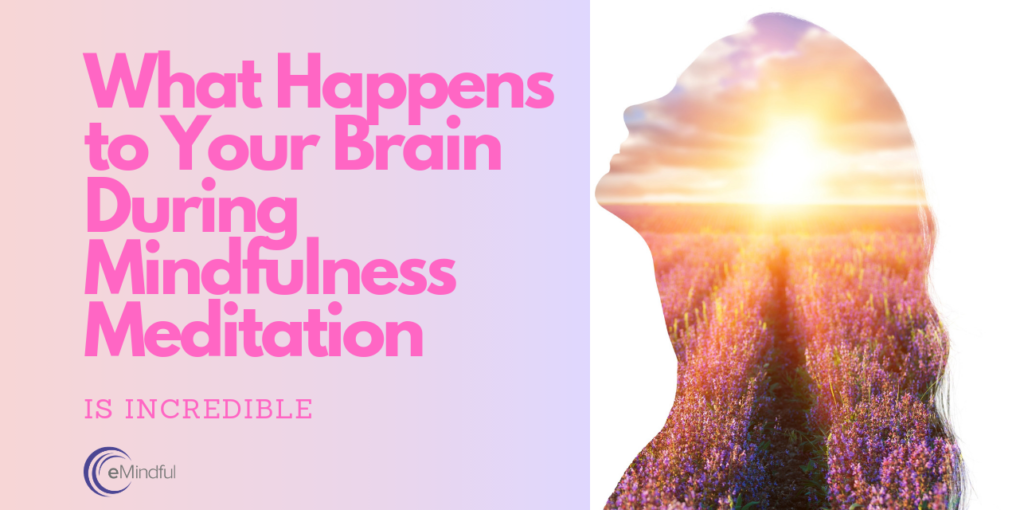
April 22, 2019
What Happens to Your Brain During Mindfulness Meditation is Incredible
By Mindfulness Teacher Kelly Barron
The brain is truly a mysterious thing. So much so, that what we don’t know about it outweighs what we do.
It’s not for lack of trying. Ever since the time of the Egyptians, physicians and scientists have sought to answer the age-old question: How does the brain work?
The field of neuroscience, aided by brain imaging technology, is shedding more and more light on that question and also on the question of how the practice of mindfulness meditation affects our brains.
What Is Mindfulness Meditation?
Mindfulness is the awareness that arises when we pay attention to the present moment non-judgmentally with an attitude of openness and curiosity. When we meditate mindfully, we’re training the brain to pay attention mindfully, often by focusing on something that’s happening in the present moment, such as the sensations of our breathing.
The idea that such a simple, but not necessarily easy practice, might benefit and even change the structure of our brains has propelled a flurry of research as well as headlines about the benefits of mindfulness, which range from stress reduction to improved focus to better chronic pain management.
It’s still early in terms of research on how mindfulness meditation affects our brains. There are far more and better quality studies proving the benefits of exercise, for example, than mindfulness. And there’s a lot more we need to know.
But, thus far, research suggests that practicing mindfulness meditation can help our brains function better. One of the more significant, overarching findings is that mindfulness seems to help us have some control over our unruly brains.
The Science Behind Mindfulness Meditation
When you first begin a mindfulness practice, you might be surprised by just how rambunctious your mind is and how difficult it is to focus. The same goes for your emotions – particularly destructive ones. Sometimes, it’s difficult not to react to every irritable mood or worry about the future.
And, yet, there’s neurological evidence that mindfulness can help you reign in your wandering mind and better regulate your emotions.
To better understand the links between changes in the brain and the positive outcomes mindfulness seems to produce, researchers from Texas Tech University, the Technical University in Munich and the University of Oregon reviewed the current state of neuroscience research on mindfulness in 2015. They concluded that “mindfulness meditation might cause neuroplasticity (or changes) in the structure of, and function of brain regions involved in regulation of attention, emotion and self-awareness.”
Researchers at Yale University also found that experienced meditators could “switch-off” the so-called default mode network of the brain, which operates when the brain is not engaged in a specific task and is associated with daydreaming, rumination and anxiety. Meditators could do this while meditating. But they also could do this throughout the day, indicating that they had created a new default-mode network oriented toward more present-moment awareness and less “me” centered thinking.
One theory is that these kinds of changes allow meditators to recruit so-called high-level areas of the brain, such as the pre-frontal cortex, that allow for greater control of attention and regulation of more primal areas of the brain such as the amygdala – the seat of the stress response.

The Future of Mindfulness Meditation
Such discoveries are exciting. And many in the field of mindfulness predict that in decades to come research will show that the health benefits of mindfulness practice are as commonplace as the benefits of going for a walk, brushing your teeth or eating your vegetables.
A plethora of studies are underway to reveal whether that’s ultimately true. Either way, the best evidence for how mindfulness benefits you is to try it and discover for yourself whether or not your brain becomes focused, more at ease and even happier.
Mindfulness at Work
Have you ever considered the impact of mindfulness in your daily grind? eM Life’s Mindfulness at Work program equips you with all the tools you need to manage stress, stay focused and power through your day. Check out Mindfulness at Work today.
About the Author
Kelly Barron. M.A., is a certified mindfulness facilitator at UCLA and writer. She teaches mindfulness for UCLA’s Mindfulness Research Center as well as for corporations, schools and private groups. Kelly has worked as a mindfulness teacher with eM Life since 2016. She came to learn the value of mindfulness as a deadline-driven journalist. Now, she’s passionate about sharing mindfulness with others to help them live with more ease, clarity and joy. You can learn more about Kelly and read her blog at www.kellybarron.com.

